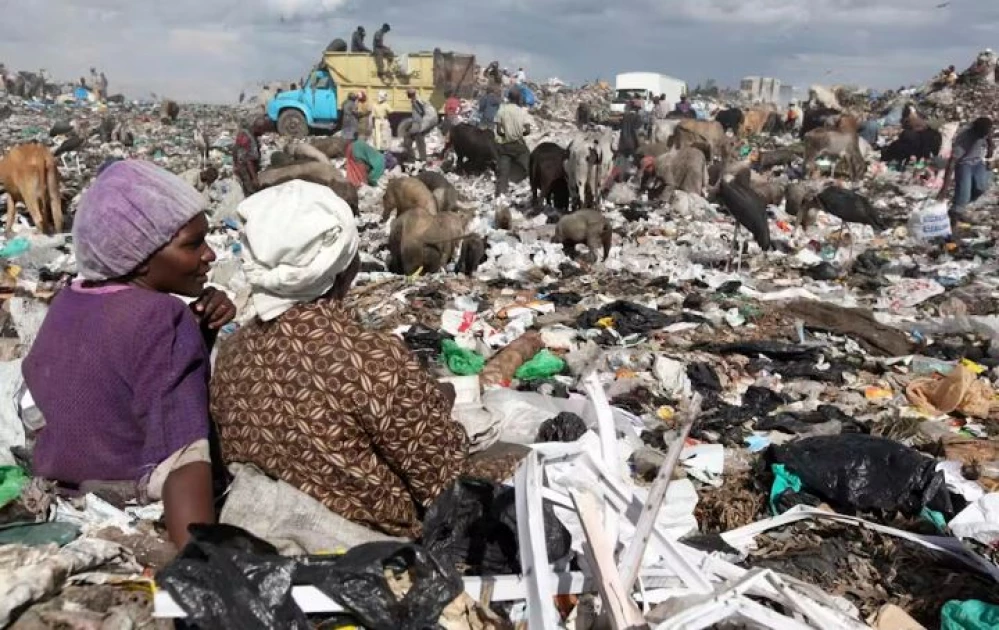Why it is important to include women in waste management

Two women seen having a conversation at Nairobi’s Dandora waste dumpsite. Photo: Reuters/Thomas Mukoya
It is not easy to fend for one’s family using waste, as Asha Mweru has discovered.
She has survived collecting wastes from Mwakirunge dumpsite in Mombasa, however, her biggest dilemma is knowing when the next garbage collector will arrive at the dump site.
“We collect metal, plastics and other items that we sell and get money for our livelihoods. But it is a total struggle, not for the faint hearted. We fight with men, something that is not always easy so as to get items for sale. At times you get and other times you don’t,” she explained.
In a day, Asha gets between Ksh.80 and Ksh.100, this is very little compared to the current high cost of living.
Asha has survived on three dump sites, starting with Kibarani, after it was closed, Marimani and currently in Mwakirunge. “This is where I get bread my daily bread,” she says.
Another woman painfully remembers the many times she has been abused as she collects the waste from the dumpsite, “Life is not easy here, as there are a lot of abuses that we go through as we collect plastic bottles for sale.”
“In every dumpsite, I have met men who impregnated me. Now I have three children from different fathers,” she says.
A new report on Waste management outlook released during the United Nations Environment Assembly (UNEA) 6 summit in February, held at the United Nations Environment Programme (UNEP) headquarters in Nairobi revealed that female waste pickers are among the most vulnerable women within their communities and society at large.
“A study of 1,025 waste pickers carried out at Brasília’s Estrutural dumpsite found that 67 per cent were female; most lived without partners (74 per cent), had three to four children (48 per cent) and had a lower monthly income (63 per cent <US$125) when compared to men (Pintas Marques et al. 2021),” the report said.
This report aims to highlight the gaps in waste management to end the triple planetary crisis amid the climate crisis on planet Earth.
Lack of inclusion was singled out as a stumbling block in waste management.
“Policies and infrastructure for municipal waste management developed without inclusive, participatory and representative decision-making are more likely to fail due to being either ill-informed or inappropriate to the local context (Medayese et al. 2021),” the report added.
“One-third of the global population is currently under the age of 20 (World Bank 2023c). These citizens will comprise the majority of service users within the planned lifetime of most new waste management systems. Excluding the views of younger generations may create long-term issues and add to the costs of waste management. Considering the benefits of engaging younger people in urban policymaking, the 2030 Agenda for Sustainable Development underlined the need to strengthen youth participation mechanisms to foster sustainable development (United 2ations 201 and Zeadat 2023),” explained the report.
Informal waste collection and sorting provide important opportunities for people with few or no marketable skills and education and with no alternative sources of income with which to survive.
Among these workers, there are often significant numbers of women, people from racial or ethnic minorities, low-income individuals and families, people with disabilities and mental health conditions, children, youth and young adults, seniors, immigrants and refugees.
“If communities already impacted negatively by inequalities in society are not prioritized by policymakers, they risk becoming further marginalized and disenfranchised. Affirmative action is needed to protect the rights of waste workers in the informal economy, as they are the backbone of the global recycling system,” said the report.
The Fifth Assessment Report (Intergovernmental Panel on Climate Change 2014) estimated the contribution of the waste sector to GHG emissions at around 3 per cent, meaning countries may have previously underestimated the potential of municipal waste management interventions in fulfilling NDCs.
Recent calculations by the International Solid Waste Association (ISWA) suggest that better waste and resource management could mitigate 15-25 per cent of global GHG emissions, and therefore, must be included in every country’s NDCs.
Worrying statistics show that, every year across the globe more than two billion tons of municipal solid waste (MSW) is generated. If packed into
standard shipping containers and placed end-to-end, this waste would wrap around the Earth’s equator 25 times.
According to UNEP and Climate and Clean Air Coalition [CCAC] 2021), waste is contributing to global warming from the methane gas released from the decomposition of organic waste in landfills and dumpsites.
Also, waste is affecting biodiversity by introduction of hazardous chemicals into soil, water bodies and the air, causing long-term, potentially irreversible damage to local flora and fauna, negatively impacting biodiversity, harming entire ecosystems, and entering the human food chain.
The waste management outlook estimates that due to pollution from waste, between 400,000 and 1 million people die every year as a result of diseases related to mismanaged waste that includes diarrhea, malaria, heart disease and cancer.
In a nutshell if waste management is not well addressed the total global cost of municipal solid waste (MSW) in 2050 is projected to reach US$640.3 billion.
All these factors necessitate speedy action to fill the gaps in waste management by using national legislation to protect the rights of the
informal waste sector and ensure their support and involvement in developing waste management services.
Also, there is a need to focus on data and use it to include waste reduction strategies in NDCs pursue opportunities for climate finance, and attract private sector investment in the delivery of waste management.
Want to send us a story? SMS to 25170 or WhatsApp 0743570000 or Submit on Citizen Digital or email wananchi@royalmedia.co.ke
Comments
No comments yet.


Leave a Comment